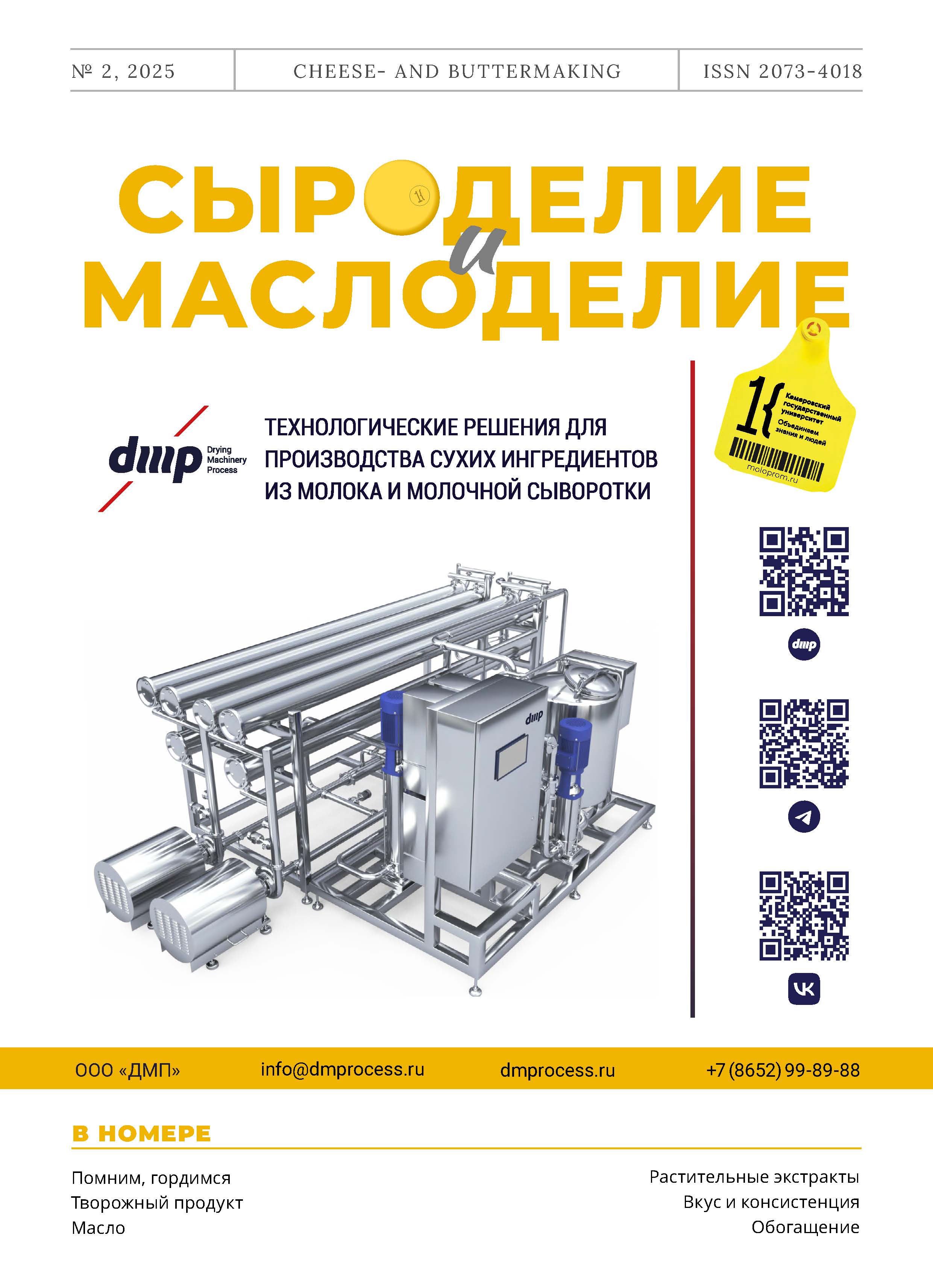Moscow, Russian Federation
Moscow, Russian Federation
Moscow, Russian Federation
High-fat foods such as butter are prone to oxidative damage and need new effective methods to prolong their shelf-life and maintain the initial quality. Such natural antioxidants as plant-derived polyphenols are safe and possess numerous bioactive properties, which makes them an excellent alternative to traditional synthetic variants. This research featured samples of butter fortified with extracts from Lamiaceae plants, their sensory profile, and antioxidant efficacy. The sage extract (Salvia officinalis L.) proved to be the most suitable plant raw material for butter production. An optimized Soxlet extraction method made it possible to increase the polyphenol yield. A quadratic mathematical model based on the Box-Behnken design made it possible to describe and optimize the extraction process. The optimal extraction conditions included 73.7% ethanol, 3.7 h extraction time, and 0.4 mm particle size.
polyphenols, antioxidants, butter, extraction optimization, Lamiaceae, Salvia officinalis L., Origanum vulgare L., Thymus serpyllum L., Thymus vulgaris L., Mentha piperita L.
1. Ullah, H. Natural Polyphenols for the Preservation of Meat and Dairy Products / H. Ullah [et al.] // Molecules. 2022. Vol. 27(6). 1906. https://doi.org/10.3390/molecules27061906
2. Bazarnova, Yu. G. Fitoekstrakty - prirodnye ingibitory porchi pischevyh produktov (obzor) / Yu. G. Bazarnova // Processy i apparaty pischevyh proizvodstv. 2010. № 2. S. 32–42. https://elibrary.ru/nccnxb
3. Zobkova, Z. S. Vybor kompleksa antioksidantov dlya molochnyh sistem s ispol'zovaniem fiziko-himicheskih metodov / Z. S. Zobkova, T. P. Fursova, D. V. Zenina [i dr.] // Molochnaya promyshlennost'. 2019. № 4. S. 46–49. https://doi.org/10.31515/1019-8946-2019-4-46-49; https://elibrary.ru/vynolh
4. Fraga, C. G. The effects of polyphenols and other bioactives on human health / C. G. Fraga [et al.] // Food & Function. 2019. Vol. 10(2). P. 514–528. https://doi.org/10.1039/C8FO01997E
5. Ruskovska, T. Polyphenols in human nutrition: From the in vitro antioxidant capacity to the beneficial effects on cardiometabolic health and related inter-individual variability - An overview and perspective / T. Ruskovska, V. Maksimova, D. Milenkovic // British Journal of Nutrition. 2020. Vol. 123(3). P. 241–254. https://doi.org/10.1017/S0007114519002733
6. Mozaffarian, D. Flavonoids, dairy foods, and cardiovascular and metabolic health: A review of emerging biologic pathways / D. Mozaffarian, J. H. Y. Wu // Circulation Research. 2018. Vol. 122(2). P. 369–384. https://doi.org/10.1161/CIRCRESAHA.117.309008
7. Kodencova, V. M. Perspektivy kompleksnoy pererabotki yagod chernoy smorodiny / V. M. Kodencova, D. V. Risnik, E. M. Serba [i dr.] // Tehnika i tehnologiya pischevyh proizvodstv. 2024. T. 54, № 3. S. 621–632. https://doi.org/10.21603/2074-9414-2024-3-2525; https://elibrary.ru/uhdavh
8. Mehdizadeh, T. Effect of walnut kernel septum membranes hydroalcoholic extract on the shelf life of traditional butter / T. Mehdizadeh [et al.] // Heliyon. 2019. Vol. 5(3). e01296. https://doi.org/10.1016/j.heliyon.2019.e01296
9. Mikdame, H. By-Products of Olive Oil in the Service of the Deficiency of Food Antioxidants: The Case of Butter / H. Mikdame [et al.] // Journal of Food Quality. 2020. Vol. 2020. 6382942. https://doi.org/10.1155/2020/6382942
10. Basheer, V. A. Mathematical modeling and kinetic behavior of Indian Umblachery cow butter and its nutritional degradation analysis under modified atmospheric packaging technique / V. A. Basheer, S. Muthusamy // Journal of Food Process Engineering. 2022. Vol. 45(8). https://doi.org/10.1111/jfpe.14042
11. Rasera, G. B. Phenolic antioxidants in the framework of Sustainable Development Goals: how far are we from zero waste? / G. B. Rasera [et al.] // Current Opinion in Food Science. 2024. Vol. 57. 101163. https://doi.org/10.1016/j.cofs.2024.101163
12. Sukhikh, S. Functional dairy products enriched with plant ingredients / S. Sukhikh, L. Astakhova, Yu. Golubcova [et al.] // Foods and Raw Materials. 2019. Vol. 7(2). P. 428–438. https://doi.org/10.21603/2308-4057-2019-2-428-438; https://elibrary.ru/kaukxb
13. Kandyliari, A. Development of Dairy Products Fortified with Plant Extracts: Antioxidant and Phenolic Content Characterization / A. Kandyliari [et al.] // Antioxidants. 2023. Vol. 12(2). 500. https://doi.org/10.3390/antiox12020500
14. Vidanagamage, S. A. Effects of Cinnamon (Cinnamomum Verum) Extract on Functional Properties of Butter / S. A. Vidanagamage [et al.] // Procedia Food Science. 2016. Vol. 6. P. 136–142. https://doi.org/10.1016/j.profoo.2016.02.033
15. Munasinghe, M. A. J. P. Impact of cardamom, cinnamon and ginger essences on keeping quality of butter / M. A. J. P. Munasinghe [et al.] // Journal of Agriculture and Value Addition. 2022. Vol. 5(1). P. 107. http://dx.doi.org/10.4038/java.v5i1.37
16. Wegrzyn, T. F. Stability of antioxidants in an apple polyphenol-milk model system / T. F. Wegrzyn [et al.] // Food Chemistry. 2008. Vol. 109(2). P. 310–318. https://doi.org/10.1016/j.foodchem.2007.12.034
17. Zagoskina, N. V. Polyphenols in Plants: Structure, Biosynthesis, Abiotic Stress Regulation, and Practical Applications (Review) / N. V. Zagoskina [et al.] // International Journal of Molecular Sciences. 2023. Vol. 24(18). https://doi.org/10.3390/ijms241813874
18. Milevskaya, V. V. Determination of phenolic compounds in medicinal plants from the Lamiaceae family / V. V. Milevskaya [et al.] // Journal of Analytical Chemistry. 2017. Vol. 72(3). P. 342–348. https://doi.org/10.1134/S1061934817030091
19. Popova, O. S. Sravnitel'naya harakteristika effektivnosti razlichnyh metodov ekstrakcii polifenolov iz rasteniy semeystva Yasnotkovye / O. S. Popova, L. N. Skrypnik // Uspehi sovremennogo estestvoznaniya. 2017. № 6. S. 34–38. https://elibrary.ru/zbnchb
20. Dzah, C. S. The effects of ultrasound assisted extraction on yield, antioxidant, anticancer and antimicrobial activity of polyphenol extracts: A review / C. S. Dzah [et al.] // Food Bioscience. 2020. Vol. 35. 100547. https://doi.org/10.1016/j.fbio.2020.100547







